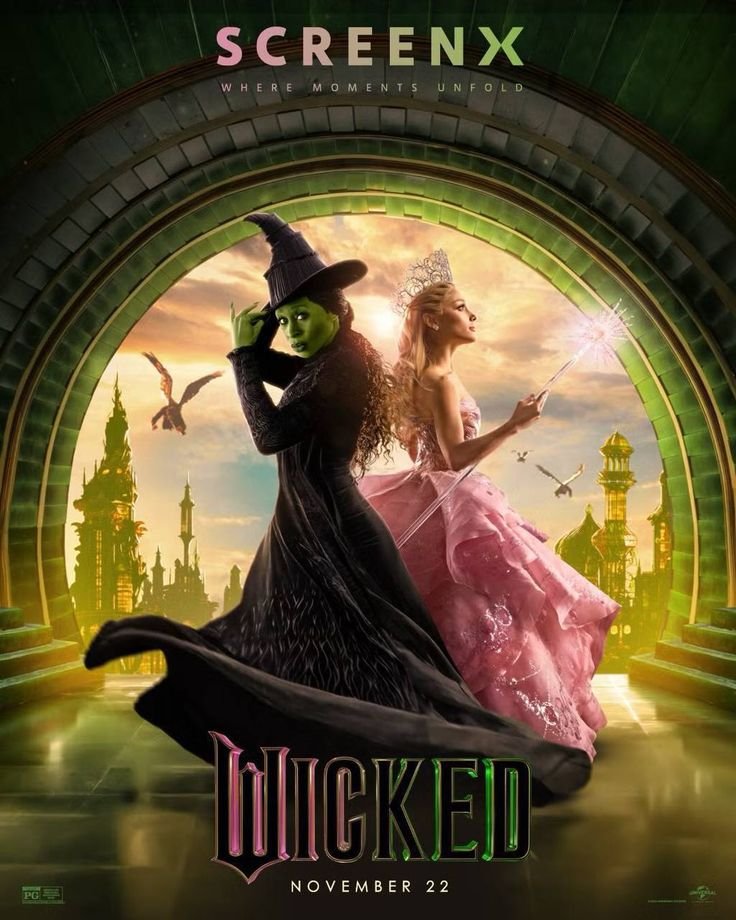Wicked: Part 1
It's time to trust my instincts
Close my eyes and leap
Welcome to the Land of Oz, a world that feels like an old friend. For some, it’s a cherished childhood memory, a world of whimsy and wonder. For others, it’s uncharted territory, promising an introduction to a story as timeless as it is complex. But does this ambitious project succeed in capturing the magic, or does it fall victim to the weight of its own legacy?
Adapting Wicked, and by extension the world of The Wizard of Oz, is no easy task. The original film is a cinematic cornerstone, while the Broadway production, immortalized by Kristin Chenoweth and Idina Menzel, set an untouchable standard for live theater. These stories are nuanced, magical, and rich with universal truths, yet they carry the burden of their history. It’s a world layered with politics, identity, and the eternal struggle between good and evil—a resonance that feels strikingly relevant today. With Wicked, director Jon M. Chu delivers a cinematic experience that dares to walk the fine line between nostalgia and reinvention, and the result may surprise even the most skeptical viewers.
While the film stays faithful to the original material, it’s impossible not to draw parallels to modern realities. At its heart, Wicked tells the story of Elphaba, a character who stands up against a corrupt regime, sacrificing herself for her ideals. Cynthia Erivo’s portrayal of Elphaba is nothing short of transcendent. Her performance is nuanced, tender, and brimming with conviction, delivering the character’s journey of resilience and hope with unmatched grace. She captures Elphaba’s outsider spirit, infusing her with optimism and a relentless belief in a better world.
Ariana Grande-Butera as Glinda, a role she has dreamed of playing her entire life, is a delightful surprise. Despite some occasional over-the-top moments, she brings charm and sincerity to the character, proving her commitment to the role. Jonathan Bailey as Fiyero also deserves recognition, growing into his role as the story unfolds. His musical and dance sequences add layers to a character that initially feels a bit too much.
The ensemble cast operates like a well-oiled machine, propelling the narrative forward much like the train in Oz’s magical world. The visual storytelling is restrained but purposeful—what initially seemed muted in trailers is a deliberate artistic choice. As the characters approach the Emerald City, the colors become more vibrant, symbolizing the allure of power and its deceptive brilliance. This subtle progression enhances the film’s thematic richness, painting Oz as both a magical and morally complex place.
Jon M. Chu’s direction handles the material with reverence and creativity, making Wicked feel accessible to both seasoned fans and newcomers. The film’s pacing occasionally falters, and some scenes feel slightly prolonged, but the story’s emotional core remains intact. It’s a rare adaptation that opens its doors wide, welcoming all into the world of Oz, whether they know it from books, the 1939 film, or Broadway.
For long-time fans, Wicked is a nostalgic journey that evokes the magic of childhood, filled with Easter eggs and references that tug at the heartstrings. For newcomers, it’s an introduction to a timeless story of a complicated friendship, love, selflessness, and the courage to challenge injustice.
By the time the credits rolled, I started clapping. In a chain theater, where applause is almost unheard of compared to the lively receptions often found in indie cinemas, it’s a rare treat. And the audience supported me. It’s an example of a musical adaptation that feels both deeply personal and universally resonant, deserving every clap it received that night.
8.5/10
